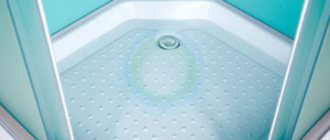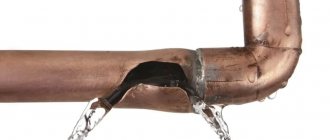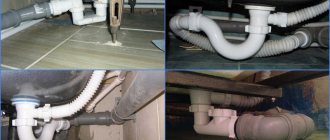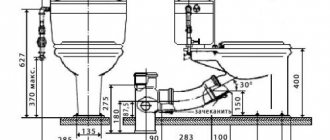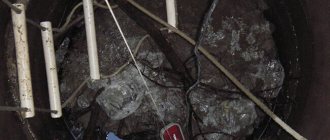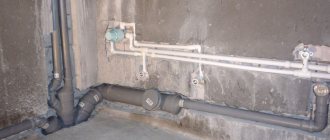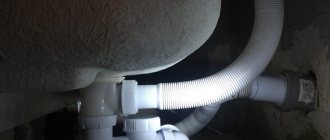Unpleasant odors in the bathroom or toilet of a private home are a common problem. They can be so strong that they can be felt in living rooms, the dining room or even the kitchen. “Scents” permeate all things and interior items, making the life of household members simply unbearable. They need to be dealt with in effective ways, and not just by spraying air fresheners, which are practically useless. This article will tell you about all the causes of sewer odors, as well as ways to eliminate them.
The main causes of unpleasant odors in the bathroom and toilet
Unpleasant odors do not appear out of nowhere; they always have a source and a reason. Among them are:
The cause of the smell may be a violation of the integrity of the sewer pipes
- disruption of the technological process during installation work (laying a drain);
- poor ventilation in the room;
- the appearance of invisible cracks and leaks in the sewer drain;
- clogged drain pipe;
- malfunction of the water seal, which is responsible for preventing sewer fumes from entering the premises.
Clogged drain pipe
This is one of the first reasons for the appearance of unpleasant odors in the bathroom. It occurs due to improper use of plumbing equipment. To remove a clog from a drain, you need to clean it using chemicals, a plunger, or any other device.
Cleaning your pipes can help eliminate odors.
Chemical household products
Household chemicals (“Mole”, “Domestos”, “Mr. Muscle”, “Floop”, etc.) quickly clear pipes from unwanted blockages, but they are quite expensive. Before using them in practice, you need to carefully read the instructions, find out information about which pipes they can be used to clean, so as not to cause harm to the material.
Advice! An alternative option for home use is baking soda and vinegar (pour baking soda into the drain, add 9% vinegar, wait 5-10 minutes, rinse with running water). Every housewife has these ingredients in her kitchen, so the “saving” remedy will always be at hand.
Plumbing fixtures
A plunger or a metal cable are auxiliary tools for cleaning drains in the bathroom with your own hands. Their use is quite simple, so it will not cause any particular difficulties.
How to remove odor from a cesspool without pumping?
Sometimes it happens that the pit simply smells strongly and ruins the life of the residents of the house. This may occur due to incorrect design, outdated septic tank design, or location of the waste tank too close to the home.
In this case, you need to use special drugs. They neutralize the processes occurring in sewage and purify the air.
Let's consider two main types of agents - chemical and biological.
Chemicals for odor neutralization and methods of their use
When answering the question of how to remove the stench from a cesspool, you can choose two options. The first is chemical cleaning as a replacement for mechanical cleaning. The sewage has to be pumped out. Then the walls are treated with chemicals and the entire container is washed. The second approach is to pour or backfill the active drug directly into the filled septic tank.
The table shows three classes of remedies to get rid of the problem.
| Type of composition | Description |
| Nitrate cleaners | The basis is nitrates. To enhance their effectiveness, manufacturers add additional chemical components to the formulation. The main feature is high chemical aggressiveness. Nitrates are a very effective remedy - literally in the first hours you will feel that the smell has greatly decreased. But you need to use the composition very carefully. The effluent becomes even more toxic. If they spill onto the soil, they can poison it. Owners of old septic tanks are better off abandoning such chemicals - all vegetation on the site within a radius of several meters may die if a leak does occur. The same applies to old cesspools with an open bottom. |
| Acids | They provide high quality cleaning – they gradually dissolve sludge and solid waste. They peel off from the walls, fermentation stops, and the smell goes away. You cannot use acids if you have a plastic septic tank - there is a risk of burning a hole in it. Owners of open-bottom cesspools should also give up acids. |
| Ammonium | The safest type of chemicals. Gives a good effect of reducing unpleasant odors and cleans containers. But it is not suitable for residential buildings and places with highly chlorinated water. Even regular dishwashing detergents can neutralize its effects. |
Although many instructions on the Internet say that by purchasing chemicals you can do everything yourself, you should not believe this. It is difficult and dangerous to work with such products, especially if the septic tank is supposed to be completely drained. If the compositions come into contact with mucous membranes, they can cause severe burns requiring hospitalization. Even the vapors of some acids are poisonous. Damage may also be caused to your area.
Among the most popular formulations:
- "Methanediol" . This substance belongs to the class of formaldehydes. Toxic, requires careful handling. It is rarely used for cesspools in private areas; more often it is used to eliminate odor in industrial drainage systems.
- Instablue Campingaz . Another very powerful reagent. It cannot be poured into a filled cesspool; it is used as an aid during mechanical cleaning and removes deposits from the walls.
Biological cleaning agents as an alternative to chemical ones
What should you put in a cesspool so that there is no smell and the risk to plants and humans is minimal? Biologics may be considered. They stimulate the processing of wastewater by bacteria - this naturally eliminates the problem. You don’t have to worry about the sewer system or septic tank – they won’t damage it.
There are three main forms of such compositions on sale:
- In tablets . Best suited for small waste containers, approximately one cubic meter of capacity. A good solution for dry closets and self-contained showers. Many tablets must first be dissolved and only then poured into the pit.
- Liquid . Sold in cans, they are more concentrated. Suitable for large tanks. Solid waste gradually begins to dissolve, pathogenic microorganisms also die, which reduces the biological hazard of the sewage system.
- In granules . Depending on the variety, they may require dissolution or be poured into a waste storage facility unchanged. There are formulations with different degrees of concentration - you need to choose according to the volume of the septic tank.
Since this method of getting rid of stench is the most popular, let’s consider the most popular drugs and their features:
- "Doctor Robik." Many experts, when answering the question of how to fill a cesspool to prevent it from stinking, immediately recommend this type of drug. It has a good quality of dissolving most wastes that could potentially cause problems. Gives a long lasting effect. It is recommended to use the composition regularly so that the unpleasant odor does not appear at all.
- "Unique" . It gives a good level of destruction, and active bacteria do not die even in very aggressive environments. Another advantage is that the cleaning bacteria do not need air to live, so the septic tank does not have to be opened during cleaning, and this is a serious plus.
Poor ventilation
Poor ventilation contributes to air stagnation in the toilet or bathroom, as a result of which they are filled with fumes from the sewer, which is not pleasant for residents. Natural draft hoods are often used in hygiene rooms, but they are ineffective because they regularly become clogged with debris.
Bathroom ventilation system
Experts recommend installing forced ventilation devices operating from a 220V network. They quickly remove not only unpleasant odors from the room, but also moisture after taking water procedures.
Important! Cleaning natural ventilation requires the involvement of specialists with professional equipment (this is an additional financial cost that not everyone can afford).
To check the natural hood for functionality, you can use a candle or a piece of paper. If ventilation occurs at the proper level, the sheet will stick to the grate, and the flame from the candle will deviate towards it.
Microcracks in the drain of the sewer system
Another possible cause of unpleasant odors is microcracks or diaper rash that form in inaccessible places. They become sources of sewer “odors” and are very difficult to find and eliminate. Way out of this situation:
- replacing a damaged pipe with a new, better one;
- treating all suspicious areas with a sealant.
Connecting plumbing to the sewer
In order to prevent leaks from occurring in the future, and therefore the appearance of foreign odors from drainpipes, it is necessary:
- install high-quality plumbing pipes, only from trusted manufacturers (although they are not very cheap);
- when laying drainpipes, it is recommended to make as few joints as possible; cracks most often occur in these places;
- perform high-quality waterproofing of the floor and walls in the bathroom or toilet;
- place joints only in easily accessible places, although this is not always possible.
Violation of the functions of the water seal
The main purpose of the water seal is to prevent the spread of unpleasant odors from the sewer pipe. Violation of its functioning leads to the penetration of vapors from the drainage pit.
Important! A water seal is a curved section of a drain filled with water.
There are several possible reasons for its “malfunction”:
- The presence of high pressure in the drain (more than atmospheric), which pushes “fragrant” fumes into the bathroom (in the form of bubbles).
- Overflowing drainpipes, the pressure in which leads to squeezing out the water “plug”.
Types of water seals
To prevent the drain from overflowing, you must:
- periodically clean the pipes in the bathroom and toilet from possible blockages;
- in winter, make sure that the water in the sewer pipes does not freeze (this is especially true for private houses).
Advice! Experts recommend installing pipes of smaller diameter (than required by codes and regulations) on the drain.
Installation of internal sewerage
Why does a private house smell like sewer - reasons
Most often, sewer smells unpleasantly as a result of design errors:
- The project does not provide for fan ventilation intended for purging sewerage. It is a continuation of the riser upward and is led through the roof of the house into the outdoor space. The size of the drain channel is chosen equal to the diameter of the riser, and for its installation, the building design must be a special insulated shaft.
- The cap on the drain pipe is not installed, as a result of which its opening may be clogged with debris or blocked by a bird's nest. In addition, such use of a sewer pipe can lead to reverse flow of air under the pressure of strong winds.
- The height of the fan outlet is insufficient and, under certain conditions, an unpleasant odor spreads at the point of release.
- The outlet of the sewer ventilation system is located at a distance of less than four meters from the windows and emissions from it penetrate into the living space.
- The ventilation outlet from the external sewerage system (cesspool or septic tank) is not located far enough from the house or is located against the wind rose - the dominant wind direction in the area. As a result, odors are directed towards the residential building.
If the house smells like sewage, there may be operational circumstances:
- Siphon failure. These devices are installed at each drain point precisely to protect against the penetration of gases from the sewer into the living space.
During use, water remains in the bend of the siphon, which serves as a plug between the sewer and the room. A breakdown occurs when wastewater is discharged in one burst through a riser. If the diameter is insufficient, the liquid completely fills the cross-section of the passage, a zone of low pressure is formed, which draws water from the siphon along with it. As a result, the water seal is drawn into the sewer pipe, opening the passage of odors into the room.
- Siphon drying out. This circumstance occurs, as a rule, in houses with periodic visits. During the long absence of the owners, the water seal in the siphon dries out, allowing gases from the drain system to enter the room. What can you do if your private home smells like sewer? There is no other option but to agree with the neighbors so that they turn on the water in the house at least once a week in order to restore the water seals.
- Siphon failure. Careless handling of the siphon can lead to leaks as a result of the formation of microcracks or screwing onto the wrong threads in the connections. There can be only one way out - a careful and attentive attitude to plumbing equipment.
Violation of the technological process of installation work on laying sewer pipes
This is the biggest cause of sewer odors in your home.
Incorrectly performed installation work on laying drain pipes leads to large financial costs (since a complete replacement of the pipeline is required). This situation occurs when homeowners, without special professional knowledge or any experience, try to install it themselves.
Advice! To avoid unnecessary financial costs, the laying of sewer pipes should be entrusted to professionals with many years of experience in carrying out such work. They will do their job competently, and most importantly, correctly and reliably.
When the first signs of unpleasant odors appear in the toilet or bathroom of a private home, it is imperative to eliminate their cause. Cleaning the drain will not take much effort and time, but will minimize the likelihood of sewer fumes penetrating into residential premises. It is better to get rid of the problem immediately than to deal with its consequences over a long period!
Sewage smell in the apartment: video
How to eliminate sewer smell: photo
Cracks in pipes and incorrect connections
There are other reasons why the air in an apartment/house becomes smelly. Old cast iron analysis pipes and fittings in homes often develop small, unnoticeable cracks. The contents of the sewer leak through them, and specific odors penetrate. Leaks can be very minor and difficult to detect.
The next problem lies in the incorrect installation of the internal sewage system, and/or poor-quality connection of plumbing to the main risers. In some cases the slope is not maintained sufficiently, in others too narrow pipes are used. It is also possible that the sealing collars or various gaskets may wear out.
If sewer odors are detected, the entire internal system in the apartment or house should be thoroughly checked. Then act according to the situation: repair (seal, replace) pipes or connecting elements.



